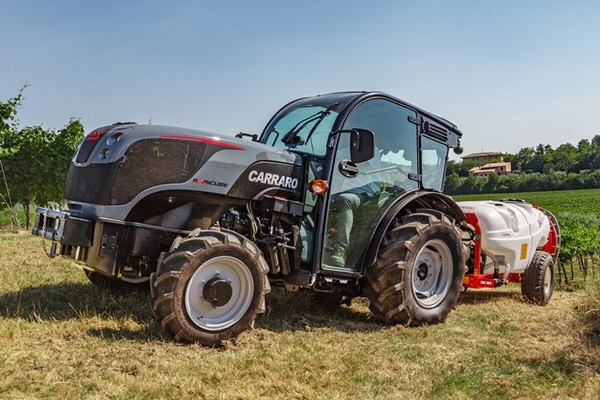
Rovigo district company
Carraro Agritalia
Agritalia was born in 1977 as a division of Carraro, historic Venetian company, and immediately became a well-known brand for orchard tractors and special models. Being part of an international group, which also manufactures in China and Latin America, has enabled the Rovigo company to start partnerships with industry giants such as Renault Agriculture and, more recently, Claas, John Deere and Massey Ferguson. With its 250 employees and associates, Carraro-Agritalia of Rovigo achieves an average turnover of 140 million euros per year.
The company manages to keep streamlined operations in the design phases, therefore offering the option to customize the models based on the needs of the customers, thanks to its relatively small scale, while being able to rely on an international industrial group for the organization and relations with foreign companies. The choice of Rovigo for this plant, confirmed over the years, arises from the evaluation of some logistic advantages, above all for the road and railway connections and for the interport. The strong point, or rather the product with which it identifies itself, is certainly the orchard tractor, which is produced in different versions and for more than one brand.
MC Elettronica
The idea of designing and building electronic systems for agricultural machines came to Claudio Mantovani in the mid-80s for personal reasons, or rather family reasons: helping his father optimize the work of the farm through electronics, for which he had a real passion. With the newly formed MC Elettronica, he then began designing equipment to automate and increase the precision of machines that were already on the market. Today many manufacturers mount the instruments made by MC Elettronica for so-called “precision farming” on their agricultural machines, such as seeders, sprayers, combine harvesters and balers. Since the start of his business, Mantovani’s trump cards have been the reliability of the products, the customization, and the ability to adapt the models to the specific needs of an individual manufacturer. Once the product specifications have been defined, the development team processes customized projects, always respecting the established costs and times. The crucial step of a product takes place in the testing laboratory, where the engineers perform all the precompatibility tests and verify the compliance with the law: verification of the IP protection degree, test on vibrating table, climatic chamber, anechoic chamber. In addition to the laboratory, MC Elettronica also has a farm and experimental fields, where it can check the resistance and correct operation in real situations of use with important field tests. With this recipe, the Rovigo company manages to export about half of the production. The core business of MC Elettronica focuses on precision and row sowing systems.
Procomas
Founded in 1978 by Ivo Calza, who still owns the majority of the company, Procomas srl designs and builds equipment for agriculture and gardening. The two partners who supported Calza in this challenge were entrepreneurs from Lombardy who were already in the public and private green maintenance sector. They presented themselves at Eima that year and the company immediately began to grow so much that already in 1983 a further building of 1,300 square metres was built, while in 1985 Intermac srl was created as a subsidiary company dedicated to the production of professional gardening machines. About 20 years ago the two initial partners were replaced by the owner’s sons, Andrea and Lara. Right from the start, the business strategy was to create products that did not exist and to design machines starting from the specific requests of the customers. They consider their after-sales service as their winning card: intervening very quickly and ensuring spare parts even after a long time keeps the customer loyal and expands the business. With its 10 employees, Procomas has achieved an average turnover of 950,000 euros a year. Half of the production is intended for export, concentrated in European countries. Production is concentrated above all on brushcutters, featuring the hydraulic ones with telescopic arms up to 18 metres long and those combined with the suction system to collect the cut grass. The brushcutters can be combined with tractors and used for road and motorway edges even in the presence of kerbstones and guardrails.
Spedo
When in 1967 he founded his company together with his sons Tiberio and Romeo, Antonio Spedo already had forty years of experience in the agricultural machinery sector. He decided to specialize immediately in equipment to prepare seedbeds and for processing in plantations arranged in rows, which he began to design and build. In recent years, to these historical products he has added the shredders, hydraulic forklifts and machines for harvesting olives and hanging fruits. To cope with the increase in production, and to maintain the level of specialization achieved, the company also uses external workshops, some of which have now been partners for many years. The top line, which characterizes the Spedo brand, is definitely the in-row cultivators, equipment that can mechanically eliminate weeds without using chemicals. This has led the company to immediately corner the specialized organic crop markets, and today it sees the market for these machines expanding to traditional crops, where there is increased sensitivity towards the reduction of synthetic pesticides. The range was subsequently completed by mulchers, pruners, rippers, forklifts and tree shakers. If, however, we want to pick a symbolic product that identifies the brand, we must mention the inter-row weeder. With its 35 direct employees and a sales staff of around 10 employees, Spedo invoices between 6 and 7 million euros. Half of sales come from exports, mainly to France, Portugal and Germany.








